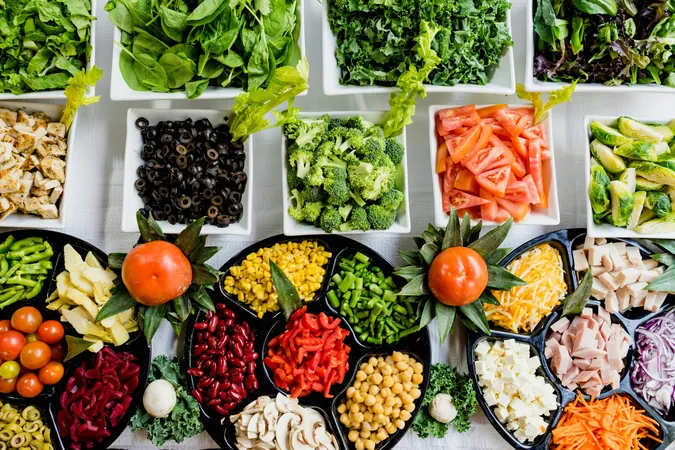
Surprising Study Reveals Average Brit Consumes 49 Different Species Weekly!
2025-07-01
Author: Siti
A groundbreaking study on dietary patterns in the U.K. uncovers a striking revelation: the average British person consumes at least 49 different species of food every week!
Utilizing advanced algorithms, researchers examined over 6,000 food and drink items cataloged in the National Diet and Nutrition Survey (NDNS). By analyzing thousands of four-day food diaries, they unveiled that individuals enjoy an average of 29 unique species on the first day, adding nine more on day two, five on day three, and four on the final day. This indicates that total weekly consumption exceeds 50!
These species encompass various meats, seafood, fruits, vegetables, herbs, and spices, while excluding certain extracts and flavorings from the counts.
Published in the journal Public Health Nutrition, this peer-reviewed paper illustrates the effectiveness of this innovative method for assessing dietary diversity, providing insights that can help countries with high processed food consumption adopt healthier eating habits.
Highlighting the significance of diet diversity, the study emphasizes the positive link between adhering to dietary guidelines and achieving a higher Dietary Species Richness (DSR). Following recommendations to consume five servings of fruits and vegetables daily, along with one or two fish meals weekly, significantly boosts the variety of species in our diets.
Professor Baukje de Roos, lead author of the study, states, "Incorporating more species into our diets can enhance their quality and, consequently, our health outcomes." Meanwhile, a representative from the Unilever Foods Innovation Center expressed pride in participating in this cutting-edge research, aimed at improving nutrition and public health through diversified diets.
While the health benefits of a varied diet are well documented, they have typically been gauged by food groups rather than individual components. However, the current shift towards understanding food biodiversity, including plants, animals, fungi, and even insects, is crucial for both human and planetary health.
Notably, previous research indicates a link between higher DSR and lower mortality rates, spurring discussions on incorporating DSR into public health strategies as a potential new standard for healthy eating.
Commercial nutrition programs increasingly encourage consumers to aim for a variety of food types weekly to enhance gut microbiome diversity. Yet, questions linger about the best methods for measuring DSR and its true connection to diet quality.
The study highlights that older behaviors, such as limiting sugar and salt, surprisingly correlate with lower DSR. It also notes that higher DSRs are more common among younger individuals, those with greater financial means, and inhabitants from less deprived areas, revealing no substantial gender or ethnic disparities.
The researchers conclude that understanding how food biodiversity relates to diet quality and health is crucial for utilizing it as a valid new metric linking diets to well-being and environmental health. They stress the need to preserve global biodiversity through informed dietary choices while ensuring affordable access to high-DSR foods.
With careful analysis of dietary data from over 3,500 participants across demographics, this study paves the way for future research and practical applications aimed at improving dietary habits throughout the U.K.




 Brasil (PT)
Brasil (PT)
 Canada (EN)
Canada (EN)
 Chile (ES)
Chile (ES)
 Česko (CS)
Česko (CS)
 대한민국 (KO)
대한민국 (KO)
 España (ES)
España (ES)
 France (FR)
France (FR)
 Hong Kong (EN)
Hong Kong (EN)
 Italia (IT)
Italia (IT)
 日本 (JA)
日本 (JA)
 Magyarország (HU)
Magyarország (HU)
 Norge (NO)
Norge (NO)
 Polska (PL)
Polska (PL)
 Schweiz (DE)
Schweiz (DE)
 Singapore (EN)
Singapore (EN)
 Sverige (SV)
Sverige (SV)
 Suomi (FI)
Suomi (FI)
 Türkiye (TR)
Türkiye (TR)
 الإمارات العربية المتحدة (AR)
الإمارات العربية المتحدة (AR)